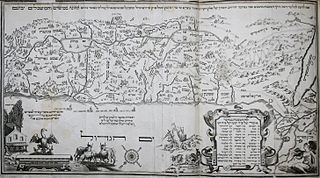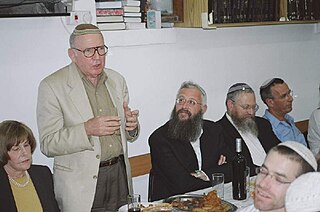Related Research Articles

Nof HaGalil is a city in the Northern District of Israel with a population of 44,184.

Aliyah is the immigration of Jews from the diaspora to, historically, the geographical Land of Israel or the Palestine region, which is today chiefly represented by the State of Israel. Traditionally described as "the act of going up", moving to the Land of Israel or "making aliyah" is one of the most basic tenets of Zionism. The opposite action – emigration by Jews from the Land of Israel – is referred to in the Hebrew language as yerida. The Law of Return that was passed by the Israeli parliament in 1950 gives all diaspora Jews, as well as their children and grandchildren, the right to relocate to Israel and acquire Israeli citizenship on the basis of connecting to their Jewish identity.

The World Zionist Organization, or WZO, is a non-governmental organization that promotes Zionism. It was founded as the Zionist Organization at the initiative of Theodor Herzl at the First Zionist Congress, which took place in August 1897 in Basel, Switzerland. The goals of the Zionist movement were set out in the Basel Program.
The history of the Jews in India dates back to antiquity. Judaism was one of the first foreign religions to arrive in the Indian subcontinent in recorded history. Rabbi Eliezer ben Jose of the 2nd-century CE mentions the Jewish people of India in his work Mishnat Rabbi Eliezer, saying that they are required to ask for rain in the summer months, during their regular rainy season, yet make use of the format found for winter in the Standing Prayer, and to cite it in the blessing, 'Hear our voice'. Desi Jews are a small religious minority who have lived in the region since ancient times. They were able to survive for centuries despite persecution by Portuguese colonizers and nonnative antisemitic inquisitions.
The Bnei Menashe is a community of Indian Jews from various Tibeto-Burmese ethnic groups from the border of India and Burma who claim descent from one of the Lost Tribes of Israel, allegedly based on the Hmar belief in an ancestor named Manmasi. Some of them have adopted Judaism. The community has around 10,000 members.
The Bene EphraimBnei Ephraim, also called Telugu Jews because they speak Telugu, are a small community living primarily in Kotha Reddy Palem, a village outside Chebrolu, Guntur District, and in Machilipatnam, Krishna District, Andhra Pradesh, India, near the delta of the River Krishna. They claim to be descendants of the Tribe of Ephraim, of the Ten Lost Tribes, and since the 1980s have learned to practice modern Judaism.
Nefesh B'Nefesh, or Jewish Souls United, is a nonprofit organization, promotes, encourages and facilitates aliyah from the United States and Canada.
Chinese people in Israel comprise several separate groups, including the groups of Jews from China who have immigrated to Israel making aliyah, as well as foreign students studying in Israeli universities, businessmen, merchants, and guest workers, along with Israeli citizens of Chinese ancestry.

The Ten Lost Tribes were those from the Twelve Tribes of Israel that were said to have been exiled from the Kingdom of Israel after it was conquered by the Neo-Assyrian Empire around 720 BCE. They were the following: Reuben, Simeon, Dan, Naphtali, Gad, Asher, Issachar, Zebulun, Manasseh, and Ephraim—all but Judah and Benjamin, both of which were based in the neighbouring Kingdom of Judah and therefore survived until the Babylonian siege of Jerusalem in 587 BCE. Alongside Judah and Benjamin was part of the Tribe of Levi, which was not allowed land tenure, but received dedicated cities. The exile of Israel's population, known as the Assyrian captivity, occurred in line with long-standing Assyrian deportation policy, which was practiced in many subjugated territories.
Shavei Israel is an Israel-based Jewish organization that encourages people of Jewish descent to strengthen their connection with Israel and the Jewish people. Founded by Michael Freund in 2002, Shavei Israel locates lost Jews and hidden Jewish communities and assists them with returning to their roots and, sometimes, with aliyah. The organization's team is composed of academics, educators and rabbis.

Tal Menashe is an Israeli settlement, formerly Israeli outpost, in the West Bank, retroactively legalized under Israeli law as an extension (suburb) of the Israeli settlement of Hinanit, located in the Samarian hills on the northwestern edge of the West Bank. The outpost, under the administrative municipal government of the Shomron Regional Council, is adjacent to Hinanit and Shaked. It was founded in 1992 as an Israeli outpost next to the settlement of Hinanit, and moved to it final land at 1999 on state lands nearby. It was founded by a group of Israelis from a kollel in Mevaseret Zion and from the Technion in Haifa.

Shavei Shomron is an Israeli settlement in the northern West Bank. Built on lands confiscated from the neighboring Palestinian villages of An-Naqura and Deir Sharaf, it is located to the west of Nablus, on the road to Tulkarm. It is organised as a community settlement and falls under the jurisdiction of Shomron Regional Council. In 2022 it had a population of 1,083, mostly religious Zionist and Modern Orthodox Jews. Its municipal jurisdiction is 664 dunams, of which 272 dunams are built up.

Haim Drukman was an Israeli Orthodox rabbi and politician. The most senior spiritual leader of the Religious Zionist community at the time of his death, he served as rosh yeshiva (dean) of Yeshivat Or Etzion, and head of the Center for Bnei Akiva Yeshivot.

Irving Moskowitz was a highly controversial American physician, businessman, and activist. His activism, in part, sought to create a Jewish majority in Palestinian Arab neighborhoods of East Jerusalem by purchasing land.

Michael David Evans is an American author, journalist, and commentator. Evans has written books and has provided analysis and commentary on Middle East affairs. He founded and serves as the head of many politically conservative Christian organizations.
Hinduism and Judaism are among the oldest existing religions in the world. The two share some similarities and interactions throughout both the ancient and modern worlds.
Russians in Israel or Russian Israelis are post-Soviet Russian citizens who immigrated to Israel and their descendants. As of 2022, Russian-speakers number around 1,300,000 people, or 15% of the Israeli population. This number, however, also includes immigrants from the Soviet Union and post-Soviet states other than Russia proper.

Ohad Tal is an Israeli politician who serves as a member of Knesset for the National Religious Party–Religious Zionism. He heads the Public Enterprises Knesset Committee, and is a member of the Security and Foreign affairs committee, Economics committee and Diaspora and absorption committee.
Yehoshua Fass is an American-Israeli rabbi and the co-founder and Executive Director of Nefesh B'Nefesh. The Jerusalem Post listed him among the fifty most influential Jews of 2017, and he is the recipient of the Moskowitz Prize for Zionism.

Gerim, specifically gerey tzedek, are converts to Judaism who are considered full members of the Jewish nation. In Jewish mysticism, they are considered to have Jewish souls, prompting their decision to pursue Jewish conversion.
References
- ↑ "Michael Freund". The Jerusalem Post | JPost.com. Retrieved 2024-08-09.
- 1 2 3 4 5 6 7 8 9 Fishbane, Matthew (19 February 2015). "Becoming Moses". Tablet Magazine. Archived from the original on 3 June 2016. Retrieved 2 May 2016.
- 1 2 3 Kestenbaum, Sam (28 April 2016). "The New Jewish Diaspora?". The Forward. Retrieved 2 May 2016.
- 1 2 3 Mochkofsky, Graciela (28 April 2016). "The Faithful". California Sunday Magazine . Retrieved 2 May 2016.
- ↑ "Fundamentally Freund: Reflections of a 'Baal Teshuva'". The Jerusalem Post | JPost.com. 2016-11-09. Retrieved 2024-08-09.
- ↑ Forero, Juan (24 November 2012). "Colombian evangelical Christians convert to Judaism, embracing hidden past". Washington Post. Retrieved 2 May 2016.
- ↑ "Fundamentally Freund: We need more Jews". The Jerusalem Post | JPost.com. 2009-05-14. Retrieved 2024-09-23.
- ↑ Staff, JLBC (2014-06-19). "Michael Freund, Founder of Shavei Israel, Awarded Moskowitz Prize". The Jewish Link. Retrieved 2024-08-11.
- ↑ www.israelnationalnews.com https://www.israelnationalnews.com/news/179237 . Retrieved 2024-08-11.
{{cite web}}: Missing or empty|title=(help) - ↑ "Zionists to receive Moskowitz Prize in Jerusalem". The Jerusalem Post | JPost.com. 2014-05-28. Retrieved 2024-08-11.
- ↑ www.israelnationalnews.com https://www.israelnationalnews.com/news/100617 . Retrieved 2024-08-11.
{{cite web}}: Missing or empty|title=(help) - ↑ "Israeli "Lost Tribes" Lawsuit Roots Go Back To A Clinton Pardon". Today's General Counsel - Serving In-House Counsel and Corporate Executives. 2019-10-07. Retrieved 2024-03-17.